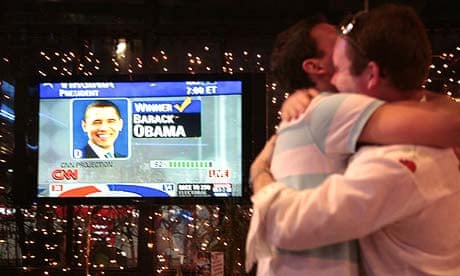Barack Obama's historic election could hit the ability of British universities to recruit lucrative overseas students.
Universities in the UK have benefited from the negative perception of America around the world since the September 11 terrorist attacks and the tightening of visa requirements that followed.
But it is thought "4/11" could be just as significant as "9/11" in terms of its impact on international student recruitment, with many now choosing to attend American universities.
Tougher US visa restrictions that came in after the September 11 attacks have recently been lifted. American universities are actively trying to recruit overseas students once more, just as the British government tightens visa arrangements.
It is estimated that international students bring £3.5bn to UK universities each year and up to £10bn to the British economy as a whole.
Dominic Scott, chief executive of the UK Council for International Student Affairs, said there will inevitably be a shift in perception as a result of Obama's victory that will work to the advantage of the US.
"The UK has increased its recruitment quite successfully over the last four or five years, because of increased security measures that made the US less attractive and far less welcoming. UK institutions put more investment into the quality of the international student experience and visa charges were kept relatively low and entry procedures simple," he said.
"The Obama success puts us into a whole new chapter and 4/11 could well be as powerful and influential as 9/11."
He said the US would "without doubt" become more attractive as a destination, and UK institutions would have to raise their standard of service to hold on to current market share and avoid being "swept aside by the sleeping giant".
"The government will also have to ensure that the new points-based system - together with biometrics and identity cards - is introduced as efficiently as possible and that visa charges continue to be held at current rates," Scott said.
The security measures could act as an unwelcome obstacle to international students. The impact would be felt in next October's academic year.
"While we are introducing biometric testing before people can come to the UK, the US will look like its doors are open far wider," he said.
"The prime minister's initiative has been a powerful vehicle for promoting the UK more effectively around the world - but it may well need a whole new head of steam over the next 12 months."
On the other hand, Scott conceded, the political changes could also lead to an influx of more "open-minded" US students with a global perspective deciding to come to the UK to study.
Will Archer, director of i-Graduate which conducts surveys of international student recruitment, said the date of Obama's election was significant as it would mark the start of a change in sentiment towards the US.
"The US is seen as the most attractive place to study, but students and parents held back while the it was seen as relatively unwelcoming.
"This is the most dangerous time in recent history to cut UK investment in marketing and recruitment because students have so much choice and now there is the enhanced attraction of America."
Dr Bahram Bekhradnia, director of the Higher Education Policy Institute thinktank, agreed that there was a risk overseas students would be lured to the US.
"The UK has benefited greatly over the last seven years from the negative perception of the US and in particular the tightening up of visa arrangements there after 9/11 and the general feeling around the world that it was not the most welcoming place," he said.
"I'm sure that perception will change and there will be much better view of America in other countries. That will have an effect on its ability to recruit, and that will have a knock-on effect on our ability to recruit."
But international students are an expanding market, so universities will not necessarily see an immediate impact, he added.
Pat Killingley, director of higher education at the British Council, said it was too early to predict the impact of the US election.
"Obama's policy on immigration and education is likely to be much more important than any feelgood factor coming from the election," she said.
"We will only be able to evaluate this over the next couple of years - British Council research on international student decision-making suggests that students take on average two years to decide where to study."
The council will present findings from new research on the future demand for international education in the UK and US at a conference in London next month.
A spokesman for the Department for Innovation, Universities and Skills, said: "Our higher education system remains hugely attractive to international students, a fact demonstrated by the large numbers of undergraduates and postgraduates who come here to study each year from abroad, second only to the United States.
"These students are attracted here by the quality of the educational experience on offer, as well as the opportunity to take part in world class research. "We continue to work with universities and colleges to improve the visibility of our higher education sector on the global stage, which is important for protecting and enhancing the supply of international students to the UK."
